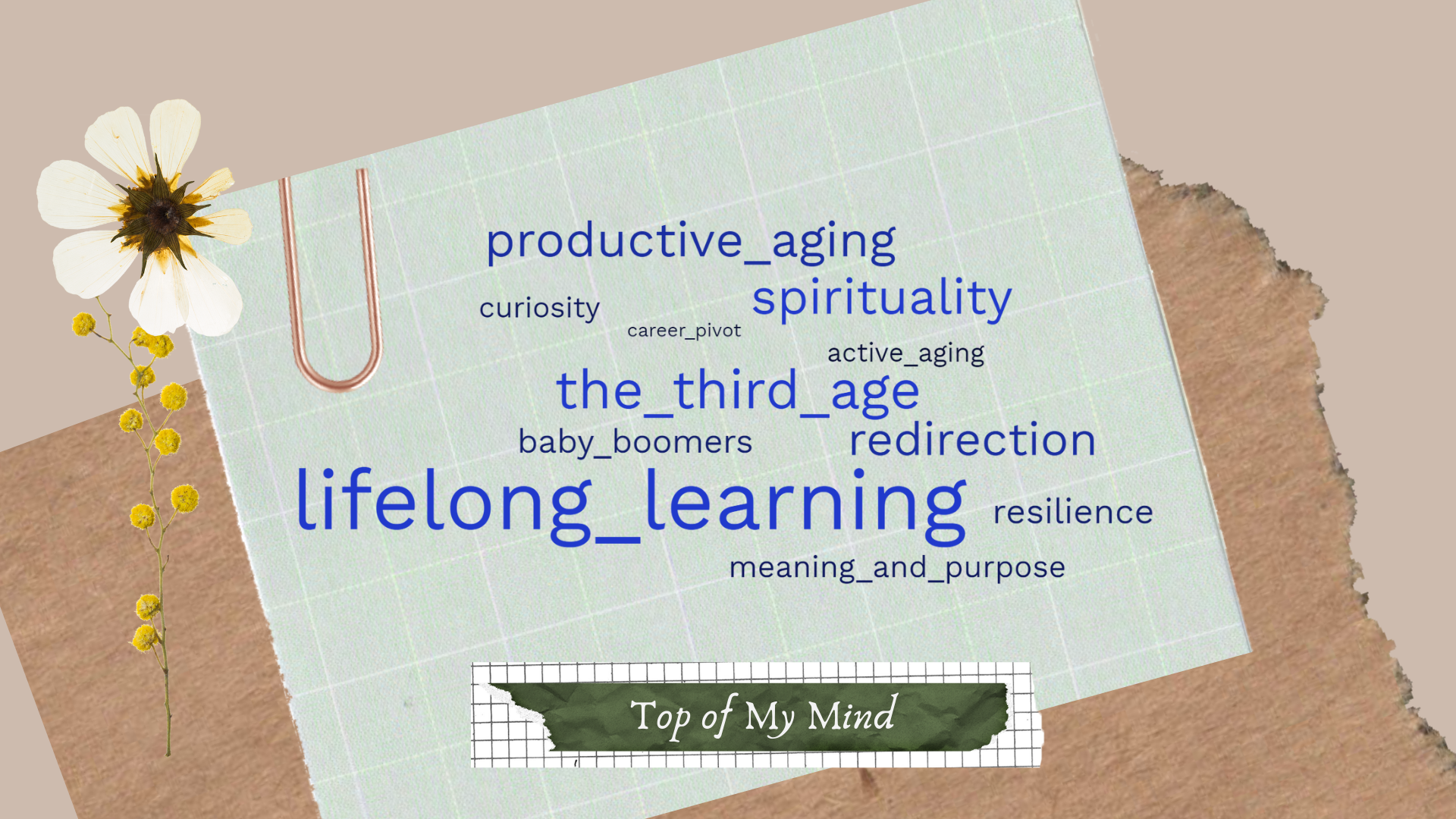My Biggest Fear Yet
September 2021 is a big month for me. It marked a few transitions. I thought about the wins, losses, and lessons in the past 12 months with some musings. I also reflected on my biggest fear. Am I such a pessimist that keeps worrying about things? Is it okay to contemplate what may come? How is it helpful (or not) to review my biggest fear?
Transitions & Retrospectives
September 2021 is a transition for me in many ways:
I passed my 3rd anniversary as a full-time Scrum Master with my current employer focusing on system implementation projects.
I finished my Master of Science Degree in Aging and Health at Queen’s University in August.
I started my Ph.D. program at Wilfrid Laurier University on September 10.
One of my daughters got married on September 4.
This post captures some of my thoughts and feelings.
Top of My Mind
What is the third age? It is a fluid period interspersed with activities in personal development, work or career advancement, and leisure. I reflected on some topics that are top of mind:
· Lifelong learning
o What have I learned in the past year? What else do I want to hone my skills on? Where will my curiosity take me, especially in preparing for my Ph.D. research?
· The third age
o How do I enjoy this period of my life and find balance in all that I do?
· Spirituality
o How do I live an abundant life being who I am and connecting with my essence?
· Baby boomers
o What are the lived experiences of the baby boomers (born between 1946 to 1964) cohort?
I will unpack some of the above topics in more detail through future blog posts. For now, let me turn to some specific retrospectives on what went well, what didn’t go well, and what I fear the most.
Wins/ Losses/ Lessons
I have gained much knowledge, critical thinking skills and established meaningful people connections in the past 12 months.
Facts and Friendship
It is a privilege to study in a prestigious Canadian University among a mixed cohort of fresh graduates and professionals such as registered nurses, a dietitian, a Naturopathic doctor, an Occupational Therapist, a youth worker, a software engineer, etc. As a mature student, I find this experience humbling. Through class discussions and group work, we shared insight from our personal and professional experiences. In one project, we studied the hospice program in a local city and learned about how little support families had while navigating the traumatic end-of-life journey of their loved ones. My group member was a seasoned Director of Care in a long-term care facility. She shared her first-hand experience and the challenges in supporting her clients.
Perspectives
I appreciate the freedom of expression from different people, cultures, and orientations. The course materials and discussions opened my mind to take into different perspectives in the lived experiences of older adults. For example, ageism is real and rampant. Aging issues are multi-dimensional and multi-faceted. I have seldom considered what does growing old means for the LGBTQ community or people with disabilities. Another big one is about the quality of life for people living with dementia and the impact on their caregivers.
Critical Thinking
Professors encouraged us to think critically through probing questions, engaging discussions, and well-structured assignments. I enjoyed the short papers on reflecting on what we had learned. However, not all assignments fell into my favorite list. Oftentimes, there were pages of instructions to follow before I could start on the assignment itself. This was a lesson on patience and perseverance! The instructions were meant to guide us to cast a wide net to explore broadly on a subject and then filter down the information to a concise form. I learned to synthesize data and provide analysis through some meaningful discussions/write-ups. I realized the importance to resist the temptation to make conclusions and judgement based on impressions, personal biases, and hasty analysis without considering the evidence from multiple angles.
What is my biggest fear going forward?
It is not about dying or paying taxes.
My Odds to Graduate
In general, universities around the world face similar challenges that it takes a long time for Ph.D. students to finish their degree and there is a high dropout rate (1). Studies from the United States indicate that the median time to complete a Ph.D. degree is 7.5 years (1). Though data on the dropout rate is less comprehensive, about 40 to 50% of doctoral students do not finish their Ph.D. degrees.
In Canada, there were 9,204 students (Canadian and International) registered in Ph.D. programs in the 2018 to 2019 school year (2). Based on data compiled by Statistics Canada, the average time to graduation is 4.9 years. About 36.5% of Ph.D. students graduate after five years (2). A small percentage of students take 6, 7, 8, or 9 years to graduate (1).
My Goal
My goal is to complete my Ph.D. degree in 4 years, a maximum of 5 years.
I am glad I was successful in winning the hurdle of completing multiple Ph.D. applications to various universities. I spent long nights pursuing the prerequisite studies, writing different versions of Statement of Interest, crafting research proposals, updating my resumes, seeking reference letters from professors and past mentors, filling out many forms and declarations, and taking the required entrance aptitude/personality test.
I started the journey of a thousand miles. Will I be able to finish my end goal?
What are the odds that I will be swept by the roadside and fall into the dropout statistics?
Would you have any suggestions for me to stay on track?
References
(1) Geven, K., Skopek, J., & Triventi, M. (2018). How to Increase PhD Completion Rates? An Impact Evaluation of Two Reforms in a Selective Graduate School, 1976–2012. Research in Higher Education, 59(5), 529–552. https://doi.org/10.1007/s11162-017-9481-z
Statistics Canada. Table 37-10-0136-05 Persistence and graduation of doctoral degree students, within Canada, by student characteristics. https://www150.statcan.gc.ca/t1/tbl1/en/tv.action?pid=3710013605




